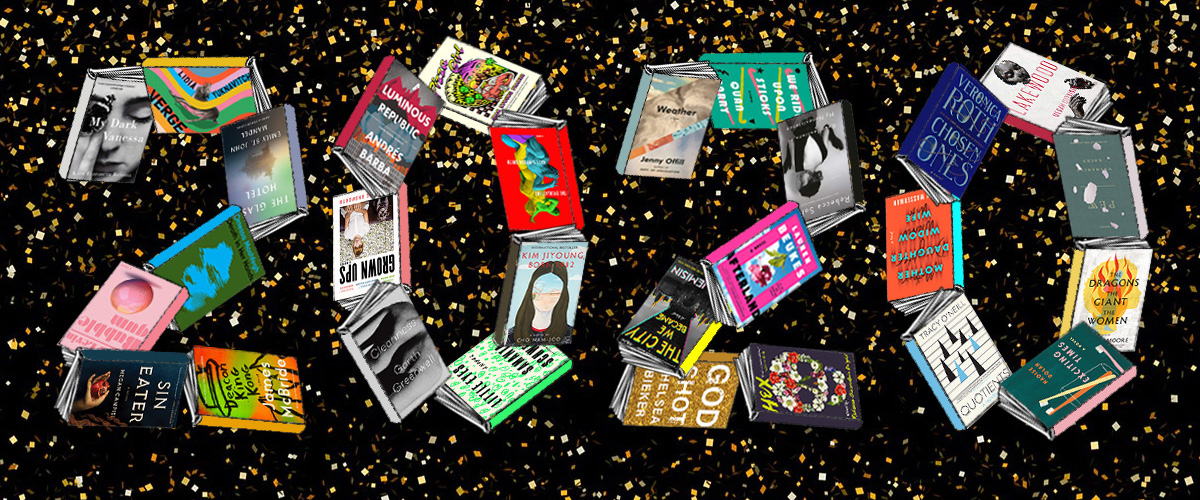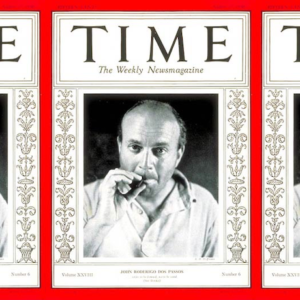APRIL
 Chelsea Bieker, Godshot
Chelsea Bieker, Godshot
Catapult, April 7
In this debut, we meet 14-year-old Lacey May, who lives in the drought-stricken town of Peaches, California, and follows Pastor Vern, who promises to end all her struggles. But then her mother disappears, and Vern’s demands begin to twist, and Lacey May begins to doubt. What unravels is a harrowing story of abandonment, pain, a cult that’s never heard of global warming, and ultimately redemption, and true family. –Emily Temple, Lit Hub Senior Editor
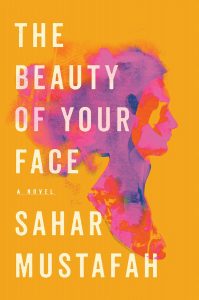 Sahar Mustafah, The Beauty of Your Face
Sahar Mustafah, The Beauty of Your Face
W. W. Norton, April 7
Afaf Rahman is the principal of Nurrideen School for Girls, a Muslim school in the suburbs of Chicago, when a shooter—radicalized by the alt-right online—attacks the school. Alternating between the attack and her memories of Palestine, The Beauty of Your Face explores faith, family, and hate with haunting precision. –Emily Firetog, Lit Hub Deputy Editor
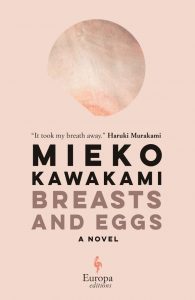 Mieko Kawakami, tr. Sam Bett & David Boyd, Breasts and Eggs
Mieko Kawakami, tr. Sam Bett & David Boyd, Breasts and Eggs
Europa, April 7
Mieko Kawakami’s first full-scale novel to be translated from Japanese into English reveals what a Catherine Wheel of talent she is, how unplaceable and unique. How forceful. In the book, three women undergo transformative change, while trying to keep up appearances. Natsu, her sister Makiko, and Makiko’s daughter, Midoriko. In the book, Makiko goes to Tokyo in search of a reasonably priced breast enhancement; meanwhile, Midoriko refuses to speak to her mother except through writing. A decade later, Natsu wonders about her life without children. Kawakami is an explosive, hilarious, and deeply perceptive writer. The way she moves among her characters here will make clear why Breasts and Eggs is the Makioka Sisters of its time. –John Freeman, Lit Hub Executive Editor
 Marie Mutsuki Mockett, American Harvest
Marie Mutsuki Mockett, American Harvest
Graywolf, April 7
Well, the Iowa caucuses are a couple weeks away and we’re doing it again: fly-by politics-as-sports reporting that frames everything as RED STATE vs. BLUE STATE, in a game that nobody can possibly win. America is much more complicated than that, and needs—if not deserves—to internalize a whole new set of narratives that center empathy and tolerance rather than the calcified mythologies of tribe and creed… Which is why Marie Mutsuki Mockett’s memoir, American Harvest, is such an important book for 2020. Mutsuki Mockett, whose father’s family goes seven generations deep in the Nebraska panhandle was born and raised in Carmel, California, to a Japanese mother, her childhood as removed from a Midwestern wheat field as you might imagine. But when she inherits the family farm, Mutsuki Mockett begins a journey into the center of America—its agrarian rhythms, its generosity, its enormous blindspots—and comes out the other side with the kind of perspective we need more of right now. –Jonny Diamond, Lit Hub Editor in Chief
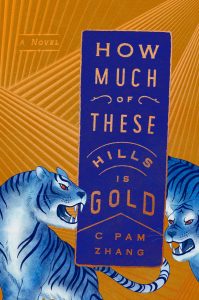 C Pam Zhang, How Much of These Hills Is Gold
C Pam Zhang, How Much of These Hills Is Gold
Riverhead, April 7
At the beginning of this debut novel, a pair of siblings are left orphaned in the American West. Hoping to find a way to bury their father, a former gold prospector and miner, according to Chinese tradition, they stuff the body in a suitcase and set off to scare up the required two silver dollars to cover his eyes. Thus begins an adventure the likes of which you’ve almost certainly never read. –Emily Temple, Lit Hub Senior Editor
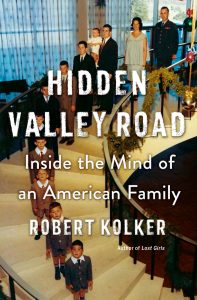 Robert Kolker, Hidden Valley Road: Inside the Life of an American Family
Robert Kolker, Hidden Valley Road: Inside the Life of an American Family
Doubleday, April 7
As in Rebecca Skloot’s phenomenal work of science, this highly readable work of narrative science tells two heartbreaking stories. In one, there is a family, in this case, one of fourteen, six of whom by the 1970s had been diagnosed with schizophrenia. On the other track, Kolker narrates the unfolding saga of the disease, its discovery, treatment, and the many decades of frustrating research. This is an astonishing work of research and empathic reporting. –John Freeman, Lit Hub Executive Editor
 Deon Meyer, The Last Hunt
Deon Meyer, The Last Hunt
Atlantic Monthly, April 7
The indefatigable detective duo of Benny Griessel and Vaughn Cupido has returned in this latest blockbuster adventure from Deon Meyer. This time, the two officers of South Africa’s Hawks elite police unit find themselves investigating a cold case: the murder of a police officer. To solve this, they must ride the world’s most opulent train ride—and hope to receive help from two travelers, who seem to have disappeared. You’ll enjoy the suspense and thrills of this runaway train of a mystery. –Olivia Rutigliano, CrimeReads Editorial Fellow
 Elizabeth F. Thompson, How the West Stole Democracy from the Arabs
Elizabeth F. Thompson, How the West Stole Democracy from the Arabs
Atlantic Monthly, April 7
This eye-popping work of history reveals the extent to which Europe is complicit in the failure of democracy in many parts of the Middle East. During World War I, Arab nationalists in greater Syria rose in revolt against Ottoman Rule, with backing of the British. In 1920, the Syrian-Arab Congress declared a constitutional government in Damascus that guaranteed equal rights to all citizens. Rather than back this move, the British and French imposed a system of mandates on the region, claiming it wasn’t ready for self-government. When the Arabs resisted, the French Army invaded—smashing the growing nascent democracy and crushing a chance for a secular Arab government. A necessary work of history in an era when the region, as ever, is treated as having “ancient hatreds” at the root of its problems. The appearance of Thompson’s book gives yet another important corrective to this historical myopia. –John Freeman, Lit Hub Executive Editor
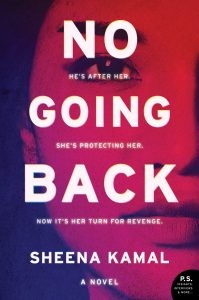 Sheena Kamal, No Going Back
Sheena Kamal, No Going Back
William Morrow, April 7
In this third installment of her excellent Nora Watts series Kamal keeps the plot in the family. The daughter the troubled Watts gave up for adoption, Bonnie, now a teenager, has a powerful enemy: the rich and brutal Zhang family, who kidnapped her in a previous book. Dao, an enforcer for the triads who did private security for the Zhangs, is particularly bent on revenge. Watts must keep Bonnie safe, which means she must track down Dao, who is as wily as he is dangerous. –Lisa Levy, CrimeReads Contributing Editor
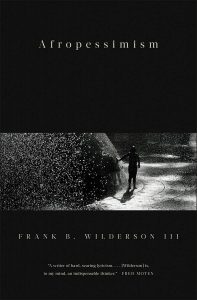 Frank B. Wilderson III, Afropessimism
Frank B. Wilderson III, Afropessimism
Liveright, April 7
What if a modern state needs blackness in order to define itself through the subjection of an other? That in effect to see African-American history as having ever transcended master-slave relationships is a fantasy? Here are two of the central notions of Afro-pessimism, and this ground-breaking book will bring the creation of this radical idea into sharp critical critical, narrative and powerful personal shape. Wilderson, who is a professor of African American studies at UC Irvine, is a lucid thinker and a beautiful writer, and he has made a work of intensely sophisticated effects. Drawing out slowly the shadows of history, as lived; attacking directly the arguments which may be plied against his book.
A former stock broker and Dartmouth graduate, who grew up in the only black family in an upscale Minnesota suburb, Wilderson’s identity is a multi-sided thing. In the last 1980s he moved to South Africa and wrote for the ANC. He has seen racism covert and overt, in many different settings. He has experienced many different kinds of danger. In the best moments this book acknowledges the necessity of allowing the multitudinousness of his self to exist, while acknowledging the world in which he lives will not. The power of this book emerges from the anguish of that gap, its attempt to lessen it some by arguing it has been created and maintained by unmovable forces. Wilderson shows by how many forces within American life, from mental illness and imprisonment, to spectacles of violence can be explained within Afro-pessimism. Here’s to hoping the book leads to many informed debates. –John Freeman, Lit Hub Executive Editor
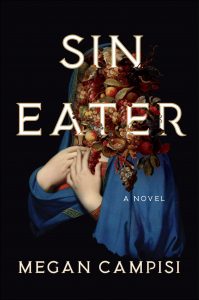 Megan Campisi, Sin Eater
Megan Campisi, Sin Eater
Atria, April 7
In 16th-century England, 14-year-old May is arrested after stealing a loaf of bred and sentenced to become a Sin Eater: one of the women who hear the last confessions of the dying, and then eat ritual foods representing their sins, taking on their burdens so the dying may go to heaven. But when May’s silent mentor refuses to eat the errant deer heart on a dead woman’s coffin—and is executed herself for her refusal—May begins to investigate the mystery herself. . . which is not super easy when you’re forbidden from speaking and other people shrink at your presence. A dark, propulsive novel that twists your stomach in all the right ways. –Emily Temple, Lit Hub Senior Editor
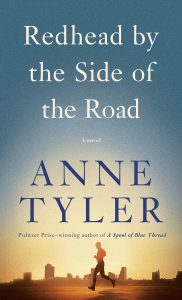 Anne Tyler, Redhead by the Side of the Road
Anne Tyler, Redhead by the Side of the Road
Knopf, April 7
Most of Anne Tyler’s novels teach a lesson to people forced to lose control. Untidiness, in her world, both literal and emotional, is the soil of happiness. Mica, the hero of her latest book is poised for a reckoning in that regard. He cleans his house in a daily routine that would make Marie Kondo beam. He eats breakfast at the same time, jogs on the same trails. He’s so careful a driver he tootles around Baltimore with an inner traffic cop praising and parsing his performance. So fastidious has he become, though, that he recognizes very little of what the world’s telling him, like how his girlfriend is about to lose her apartment. When a teenager turns up at his door, convinced Mica is his father, Tyler’s hero must confront the messier parts of his past and look at the difference between fantasy and reality. –John Freeman, Lit Hub Executive Editor
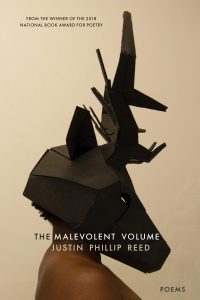 Justin Phillip Reed, The Malevolent Volume
Justin Phillip Reed, The Malevolent Volume
Coffee House, April 7
Justin Phillip Reed’s second collection moves like a mock gothic, stepping into the spaces that have been dangerous and more for the poet, and summoning bestiary of counter-menace. Heads mounted on the wall, hawks that prey in the sky, bees which noisy their hives and sweeten better than tangerine, which is “mostly texture anyway,” Reed animates them all with this huge, lance-like voice of his. Throwing their mighty symbolic power into the space of desire and his body. The beveled densities of Indecency appear less frequently here, and in its place is more of an oracular sound. How Reed found a way to write a book as fanged and fabulous and complexly musical as this one right after his National Book Award-winning debut, Indecency, is a mystery, but one thing’s clear now: he’s here to stay. These are strong poems, showcasing a range of moods and affects. Sometimes punctuated, otherwise so neatly joined they don’t need it. Sometimes gentle, in other moments, wielding fury’s high bright tone. –John Freeman, Lit Hub Executive Editor
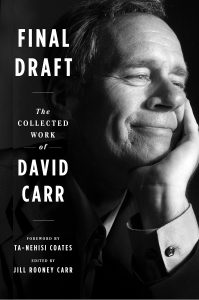 David Carr, Final Draft: The Collected Work of David Carr
David Carr, Final Draft: The Collected Work of David Carr
HMH, April 7
I’m very glad for this collection, because even though the story of David Carr’s darkest days is an important one (as told by the man himself), it is important to remember him also as the wonderful reporter he was, who made a 25-year career with wry, trenchant stories on all manner of subject, from celebrities to media consolidation to national politics. And though it’s a selfish thought, one only wonders at what Carr—and his fearless wit—would have made of the present moment and all its absurd extremes. –Jonny Diamond, Lit Hub Editor in Chief
 Veronica Roth, The Chosen Ones
Veronica Roth, The Chosen Ones
HMH, April 7
Veronica Roth’s first novel for adults (after a little YA series franchise you might you may have heard of called Divergent) has a great hook, especially for those of us who grew up reading countless books about teenagers saving the world. It begins ten years after five teenage Chosen Ones defeated the Dark Lord. Now, as young adults, they are the biggest celebrities in the world—and for some of them, that’s fine, but for others, the ones still suffering from PTSD, it’s almost unbearable. And that’s all before we get to the parallel dimension! I loved it. –Emily Temple, Lit Hub Senior Editor
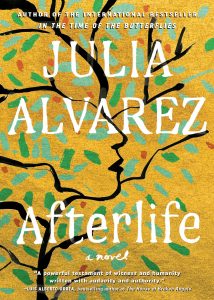 Julia Alvarez, Afterlife
Julia Alvarez, Afterlife
Algonquin, April 7
Julia Alvarez’s first novel in over a decade centers on a widowed professor of literature who must have the worst retirement ever. Shortly after she leaves her hard-won position teaching literature at a New England college, Antonia Vega’s husband of many years dies, her sister goes missing, and an undocumented immigrant girl in need turns up in her life. What an interesting counterpoint this novel makes to Jenny Erpenbeck’s novel Go, Went Gone, also about a professor suddenly roped into the court of political action on behalf of migrants. Here Alvarez imagines, in her usual big-hearted way, that it’s not seeing or reading, necessarily, but loss which tenderizes us to sympathy for others. What a book. –John Freeman, Lit Hub Executive Editor
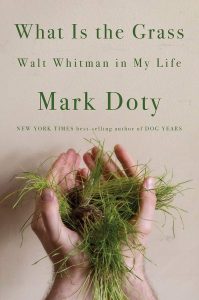 Mark Doty, What is the Grass: Walt Whitman in My Life
Mark Doty, What is the Grass: Walt Whitman in My Life
Norton, April 14
For the past decade, Mark Doty has been writing essays about the cone of light Walt Whitman shone into his life. This beacon illuminated and altered all, from Doty’s attitude toward men and desire to the way he thinks about toward riches. At last he has woven these meditations together into a single book, forming one strong narrative of biography, criticism and memoir-driven rediscovery. Doty puts on a clinic in how to read closely but expansively, going back to Whitman’s greatest poems, bouncing them off incidents in his own life, but also the work of his contemporaries. One of the most fascinating sections of the book compares Stoker and Whitman, two fellow feral souls howling at the moon in the 19th century. This is shining proof that criticism can make you want to hold it close. –John Freeman, Lit Hub Executive Editor
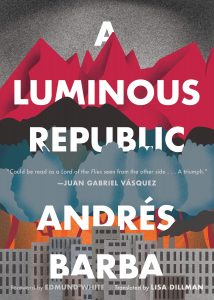 Andrés Barba, tr. Lisa Dillman, A Luminous Republic
Andrés Barba, tr. Lisa Dillman, A Luminous Republic
Mariner, April 14
Barba’s short novel Such Small Hands, also translated by Lisa Dillman, was one of my favorite books of 2017—weird and creepy and wonderful. If you’ve read it, you’ll know that he’s a master of writing about children (and their inherent strangeness and violence), so considering this latest is about a city overrun by 32 feral children, I expect it’s going to be completely brilliant. –Emily Temple, Lit Hub Senior Editor
 Richard Wagamese, For Joshua
Richard Wagamese, For Joshua
Milkweed, April 14
For almost two years now I have been telling anyone who will listen—on Twitter, in bars, on trains—to read Richard Wagamese’s novel Indian Horse, a heartbreaking account of Canada’s infamous “residential schools” in which generations of First Nations children suffered horrifying abuse and neglect at the hands of those charged with their care and their “reform.” Yet through all the misery, Wagamese—who died in 2017—is able to evoke the particular and hidden joys of childhood as they manifest through a love of hockey. So I am eager to read For Joshua, Wagamese’s searching memoir, written as a letter to his son, that explores recovery, identity, and what it means to be an Ojibwe father in a colonized world. Wagamese is a writer of rough grace and fathomless humanity who has given so much more to the world than it ever gave to him. –Jonny Diamond, Lit Hub Editor in Chief
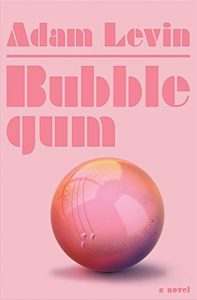 Adam Levin, Bubblegum
Adam Levin, Bubblegum
Doubleday, April 14
The latest novel from the author of the delightful (and enormous) The Instructions is, well, also enormous, at 784 pages, and looks to be pretty delightful too: it is the fictional memoir of a young man living in a fictional present, one in which the internet was never invented, and instead humankind put all its attention on Botimals, aka “cures,” tiny robotic pets. George Saunders called it “a dazzling accomplishment of wit and inventiveness—an irrepressible and insanely entertaining examination of our obsessive culture that doesn’t forget to be fond of that which it is satirizing.” Also, I heard the cover actually smells like bubblegum. –Emily Temple, Lit Hub Senior Editor
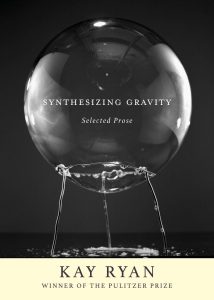 Kay Ryan, Synthesizing Gravity
Kay Ryan, Synthesizing Gravity
Grove, April 14
It should not surprise, given the jeweled perfection of her great poetry, that Kay Ryan can create some damn fine prose when she wanted to, too. This book, assembled with the help of the poet Christian Wiman, collects the best of it, to borrow the title of her Pulitzer Prize-winning collection. What a wonderful voice she displays, writing on everything from Robert Frost and Marianne Moore to the value of emptiness and loneliness. Ryan has always kept her own counsel as a poet. She perfected her game by staying out of the poetry game, and you see the effect here on her voice. She’s a kind of wisecracking philosopher, a truly original thinker, a quantum physicists of space who also, clearly, knows how her own clear voice sounds better than when alone. –John Freeman, Lit Hub Executive Editor
 Marisa Meltzer, This Is Big
Marisa Meltzer, This Is Big
Little, Brown, April 14
Marisa Meltzer was five years old when she went on her first diet. Almost 40 years later, having struggled with her weight for her entire life—and having become a successful writer—she came across an obituary for Jean Nidetch, the housewife who founded Weight Watchers. Meltzer joined the program, and set out to learn about Nidetch; the resulting book is both memoir and biography, entwining the lives of two fascinating women. –Emily Temple, Lit Hub Senior Editor
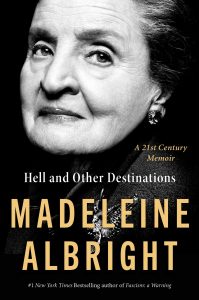 Madeleine Albright, Hell and Other Destinations: A 21st Century Memoir
Madeleine Albright, Hell and Other Destinations: A 21st Century Memoir
Harper, April 14
In a time when the state department seems to be run without design or order, and strategic thinking has been exchanged for outright corruption, Albright’s upcoming memoir can be forgiven its alarming title. America made a lot of the accelerant in many parts of the world on fire today, and we lit the matches, too, sometimes. Still, what could an enlightened use of power do in these times to prevent us from an outright hellish inferno? Why is Albright so determined to keep working for it? It’s been almost 20 years since she left office, and Albright has been busier than most current secretaries of state, writing books (she’s been a NYT bestseller six times), working in an investment capacity, speaking, teaching and joisting with prime ministers and nitwits. Chronicling her late life multi-job reinvention, Hell and Other Destinations will surely make many long for a moment when those leading diplomacy at least thought, read, or even listened to others. –John Freeman, Lit Hub Executive Editor
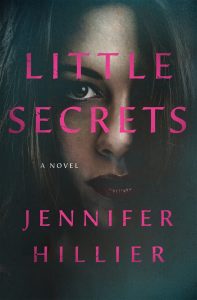 Jennifer Hillier, Little Secrets
Jennifer Hillier, Little Secrets
Minotaur, April 14
Canadian Hillier is a heck of a thriller writer, and for me, at least, her books are like potato chips: I read last year’s Jar of Hearts and couldn’t wait to gobble up her previous books, Creep, Freak and The Butcher. Little Secrets promises to be just as irresistible: golden couple Marin and Derek both run successful businesses and still find time to dote on their son, Sebastian. When Sebastian is taken, however, their marriage hits the skids. Marin lost one of the people dearest to her, and she’s prepared to go to drastic measures to make sure she doesn’t lose her cheating husband too. –Lisa Levy, CrimeReads Contributing Editor
 Mike Davis and Jon Wiener, Set the Night on Fire: Los Angeles in The Sixties
Mike Davis and Jon Wiener, Set the Night on Fire: Los Angeles in The Sixties
Verso, April 14
This huge and exhilarating work of history aims to restore some depth and accuracy to how we talk about Los Angeles in the 1960s, the decade during which “Surfin’ USA” conjured utopian dreams of a beach color, and the 1965 Watts uprising suggested there was some trouble with that dream. As Davis and Weiner show, the reality was far more complex than that pendulum swing, and Los Angeles was very different than other parts of the state in building a culture of resistance. In addition to more than 100 urban protests and near riots that surrounded Watts, resistance was being led by middle and high school students, tens of thousands of whom walked out in the mid to late 1960s. The ACLU did not follow in LA, and the authors pay tribute to their role guiding civil rights pushes. LA had the first LBGTQ street protest, it wasn’t New York, and they were fighting an entrenched white nationalism on the streets of LA too. It wasn’t just the police, but white gangs who made it hard for kids of color to surf on many beaches. Weaving between electoral politics and protest movements, from city hall to Sacramento, Davis and Weiner have created an important book to read in a time where LA needs more than ever to be mobilized. –John Freeman, Lit Hub Executive Editor
 Sara Paretsky, Dead Land
Sara Paretsky, Dead Land
William Morrow, April 14
The great V.I. Warshawski is back, bitches. That’s right: Sara Paretsky’s legendary detective returns in her 20th installment. This time, she’s pulled into a mystery involving sinister land developers when her impulsive goddaughter tries to help a destitute celebrity. But thankfully, Chicago’s touchiest PI is on the case. –Olivia Rutigliano, CrimeReads Editorial Fellow
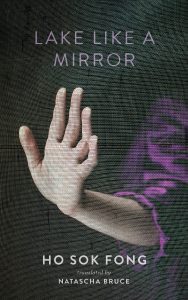 Ho Sok Fong, tr. Natascha Bruce, Lake Like a Mirror
Ho Sok Fong, tr. Natascha Bruce, Lake Like a Mirror
Two Lines, April 14
How must a Malay woman live in a strict religious society? This question is explored throughout Chinese Malaysian author Ho Sok Fong’s second short story collection (and first translated into English), Lake Like a Mirror. Ho slips between narrators, perspectives, and stylistic modes in ways that suggest just how surreal and malleable political and social arrangements really are. Two of Ho’s stories are set in rehab centers for women “judged guilty of licentiousness, deviant ideology, gender confusion, apostasy.” Ho’s women are bored, damaged, and censored, and translator Natascha Bruce helps bring these stories to life by reimagining the author’s concise, eerie writing. –Aaron Robertson, Lit Hub Assistant Editor
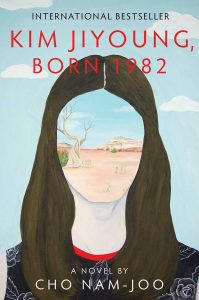 Cho Nam-Joo, tr. Jamie Chang, Kim Jiyoung, Born 1982
Cho Nam-Joo, tr. Jamie Chang, Kim Jiyoung, Born 1982
Liveright, April 14
This feminist novel became a runaway bestseller when it was first published in South Korea in 2016, selling over 270,000 copies in 10 months and over a million copies by 2018—the first Korean novel to do so since 2009. Even President Moon Jae-in read it. What’s exceptional about this book is how unexceptional its main character is: she is living the typical life of a Korean woman. It’s a testimony of subtle hardship and everyday discrimination. You’ll probably see something you recognize in there too. –Emily Temple, Lit Hub Senior Editor
 Ha Jingfang, tr. Ken Liu, Vagabonds
Ha Jingfang, tr. Ken Liu, Vagabonds
Saga, April 14
Hugo Award-winning author Hao Jingfang’s new book is set amid a second civil war, not between nations, but between opposing factions on two planets: Mars and Earth. A colony of young people from Mars is sent to Earth on a diplomatic mission to ease tensions, though the struggle proves more difficult than they’d imagined. They are left without a real sense of community or belonging, are in fact stuck between two worlds. Jingfang is the first Chinese woman to win the Hugo, and her debut novel has been translated into English by The Paper Menagerie author Ken Liu. A winning combination if there ever was one. –Aaron Robertson, Lit Hub Assistant Editor
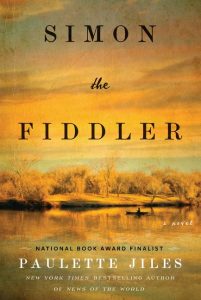 Paulette Jiles, Simon the Fiddler
Paulette Jiles, Simon the Fiddler
William Morrow, April 14
Jiles’ most recent novel, 2016’s thoroughly delightful News of the World, was one of my favorite works of fiction of the last ten years (seriously, you should all read it before the Tom Hanks movie adaptation is released later this year) so I shall most assuredly be picking up a copy of her new one, in which the author returns to her old stomping ground of 19th-century Texas. Set during the dying days of the Civil War, Simon the Fiddler is the story of a vagabond fiddle player, his rag-tag coterie of army musicians, and the Irish servant girl who steals his heart. –Dan Sheehan, Book Marks Editor
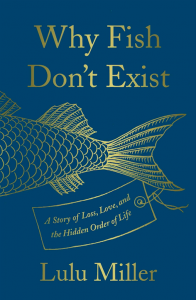 Lulu Miller, Why Fish Don’t Exist
Lulu Miller, Why Fish Don’t Exist
Simon & Schuster, April 14
From the host of NPR’s Invisibilia, this debut book tells the story of a scientist named David Starr Jordan who set out to discover as many of the world’s fish as he could, building one of the most important specimen collections ever. But in 1906, the San Francisco earthquake hit, sending over a thousand of his fish, housed in fragile glass jars, crashing to the floor. As Jordan painstakingly remade his collection, he introduced an innovation that, he believed, would protect it against the chaos of the world. Miller blends science and biography to investigate the age-old question of how to go on when everything seems lost. –Emily Firetog, Lit Hub Deputy Editor
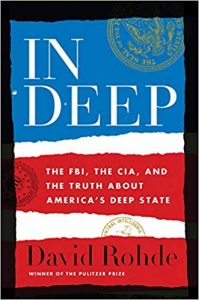 David Rohde, In Deep
David Rohde, In Deep
Norton, April 14
Somehow, three quarters of Americans now believe that a group of unelected security and military officials direct the policy of the United States. How did we get here? Is this group anywhere near that powerful, and what is it exactly that the permanent state does? Drawing on deep sources and impeccable research, two time Pulitzer-winning journalist Rohde tells the story of this fixation and what is actually there, going back to scandals at the NSA, CIA and FBI but also telling the story of what they do and who they report to. This is an important book for an election cycle that will surely be featuring the words deep state over and over again, as if it, not an out of control president, is the story. –John Freeman, Lit Hub Executive Editor
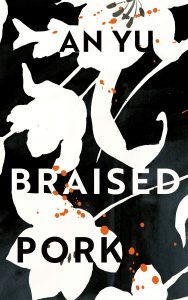 An Yu, Braised Pork
An Yu, Braised Pork
Grove, April 14
A woman walks into her bathroom on a very normal day, only to find her husband dead in the bathtub. Next to his lifeless body, there’s a strange pencil sketch. So begins An Yu’s whirlwind of a novel, which will lead you through Beijing, bring you to Tibet, coax you into hidden bars, and string you along through the protagonist’s unsettling past. The premise itself is intriguing enough, but the real magic is in watching Jia Jia stretch her limbs as she leaves behind a rather restrictive marriage and encounters places and people she never imagined. Come for the mystery, stay for self-discovery of a liberated woman. –Katie Yee, Book Marks Assistant Editor
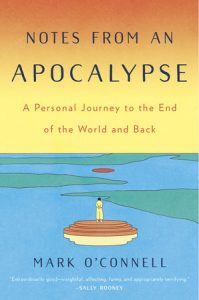 Mark O’Connell, Notes From an Apocalypse
Mark O’Connell, Notes From an Apocalypse
Doubleday, April 14
As any thoughtful observer should have realized by now, the apocalypse—the real one, climate collapse—is no longer a story we tell of the future: it is happening now, all over the world, from the bushfires of New South Wales to the sinking islands of the South Pacific to the no longer perma-frost of the Siberian taiga. Mark O’Connell is one such thoughtful observer, and takes his wry Dubliner’s sensibility on a grand tour through a grifters’ gallery of End Times hustlers and Doomsday fantasists, from the Mars Society meetings of Southern California to the sleek Silicon Valley bolt-holes of New Zealand. O’Connell is an ideal skeptic-by-proxy for such a tour, suspicious of his own sentimentality, yet not given to the death-by-statistics approach of so many recently heralded books. These are notes worth keeping. –Jonny Diamond, Lit Hub Editor in Chief
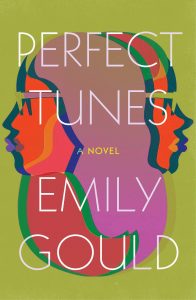 Emily Gould, Perfect Tunes
Emily Gould, Perfect Tunes
Avid Reader, April 14
Emily Gould is a delight on Twitter, and I need you to know how rarely I bestow that compliment. Perfect Tunes, her second novel, which tells the story of a friendship, a tumultuous love affair, and motherhood, is just the right balance of acerbic and warm. The novel follows a young songwriter and musician in early-aughts New York, so bonus points for music scene and jeans nostalgia. –Jessie Gaynor, Social Media Editor
 Graham Swift, Here We Are
Graham Swift, Here We Are
Knopf, April 21
Set in Brighton 60 years ago, this unexpectedly comic novel from the author of Waterland and Last Orders tells the tale of three stage performers having the season of their life, while offstage their lives grow ever more entangled. The “flimsy structure built over swirling water” turns out not to be their pier theatre, but the relationships they’re stuck into. Brisk but loose, this is a satisfying late entertainment from the Booker Prize winner. –John Freeman, Lit Hub Executive Editor
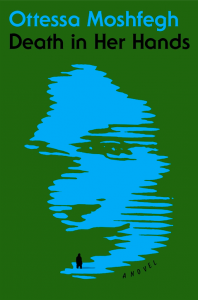 Ottessa Moshfegh, Death in Her Hands
Ottessa Moshfegh, Death in Her Hands
Penguin Press, April 21
Moshfegh returns to the thriller—sort of—with Death in Her Hands, in which an old woman finds a note in the forest near her home: Her name was Magda. Nobody will ever know who killed her. It wasn’t me. Here is her dead body. But there is no dead body, and no clues, except for the ones the woman invents for herself to follow, which gives this novel an edge of metafiction—it’s as if we’re watching Moshfegh herself work out how a mystery novel might be written, how she might weave the generic patterns in with the spark of the idea, and how it all might come together in the end—or not. –Emily Temple, Lit Hub Senior Editor
 Blake Gopnik, Warhol
Blake Gopnik, Warhol
Ecco, April 21
Blake Gopnik, who served as chief art critic of The Washington Post for a decade, has been given unprecedented access to the Warhol archives, and has matched a biographer’s rigor to an art critic’s acumen. It can be very difficult to find the life behind the icon, but as Gopnik himself says of Warhol, “The meanings of his art depend on the way he lived and who he was.” Following on the heels of Benjamin Moser’s Sontag, this looks to be another definitive biography of a massively important American cultural figure. –Jonny Diamond, Lit Hub Editor in Chief
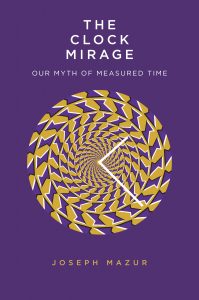 Joseph Mazur, The Clock Mirage: Our Myth of Measured Time
Joseph Mazur, The Clock Mirage: Our Myth of Measured Time
Yale University Press, April 21
Elusive, counter-intuitive (theoretically-speaking), and always looming over our heads, it is no wonder that time has been the repeated subject of contemplation of great thinkers as well as armchair philosophers. Professor of Mathematics Joseph Mazur tackles time from what seems, at first glance, a playful journey: he takes a “tour of clocks” and weaves together the personal stories of truck drivers and Olympic athletes, prisoners, and clockmakers in an effort to show how time is used by our technologies, subsumed by our bodies, and continually affecting our behaviors. Historical and analytical, Mazur’s investigation of time is sure to offer a lot of food for thought. –Eleni Theodoropoulos, Lit Hub Editorial Fellow
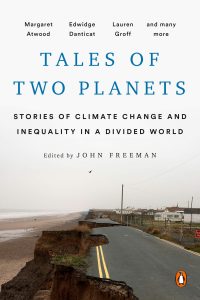 John Freeman, ed., Tales of Two Planets: Stories of Climate Change
John Freeman, ed., Tales of Two Planets: Stories of Climate Change
Penguin Press, April 21
We can no longer afford to separate issues of climate from issues of economic justice—the two are inextricably linked and we are doing a pretty terrible job managing both. You could even say it’s been a disaster. In the past few years we have seen much reported evidence of these disasters, in deeply researched, evidence-based books that recount doomsday scenarios with all the pragmatic clarity of a grocery list. But there is more than one way to write about climate change, as editor John Freeman demonstrates with this anthology of fiction, poetry, essay, and more, featuring writers like Margaret Atwood, Lauren Groff, Eka Kurniawan, Chinelo Okparanta, and others, all speaking to the shared calamity that is our collapsing world. –Jonny Diamond, Lit Hub Editor in Chief
 Rufi Thorpe, The Knockout Queen
Rufi Thorpe, The Knockout Queen
Knopf, April 28
Like her wonderful debut novel, The Girls from Corona del Mar, Rufi Thorpe’s latest, The Knockout Queen, focuses on the intensity of friendship. Two unlikely friends—a closeted gay teen named Michael Hesketh and his extremely tall next door neighbor Bunny Lampert—cope with the unfairness of life and the difficulty of existence. When an act of violence challenges their friendship, they must decide the lengths they will go to protect each other. –Emily Firetog, Lit Hub Deputy Editor
 Sara Sligar, Take Me Apart
Sara Sligar, Take Me Apart
MCD x FSG, April 28
I’m a huge fan of art world mysteries, as well as archival research, but this story should appeal to all fans of psychological thrillers. In Sligar’s confident debut, an out-of-work journalist takes on a job cataloguing the effects of feminist artist who died under mysterious circumstances. Hired by the artist’s brooding son, Sligar’s protagonist is not content to merely catalogue, and soon begins her own investigation into the artist’s demise, even as she finds herself falling for her current employer. –Molly Odintz, CrimeReads Associate Editor
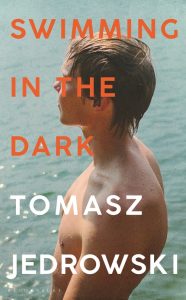 Tomasz Jedrowski, Swimming in the Dark
Tomasz Jedrowski, Swimming in the Dark
William Morrow, April 28
In O Magazine, Michelle Hart described this book as “Call Me By Your Name set in Communist Poland,” which immediately caught my interest. It is, of course, a love story, but it’s also a political one, as two young men fall in love (with a little help from Giovanni’s Room) one summer, but soon find themselves at intense political odds, even as they try to maintain their secret affair. –Emily Temple, Lit Hub Senior Editor

